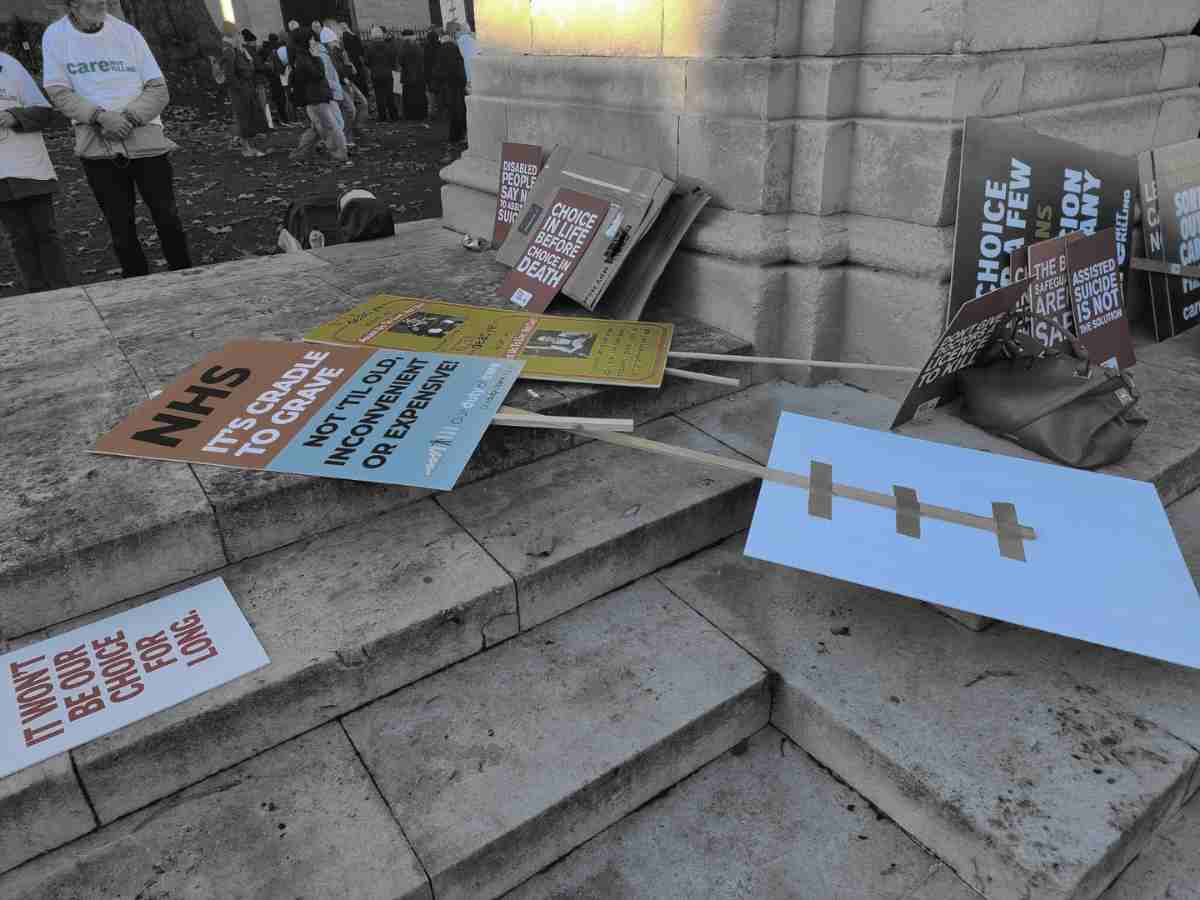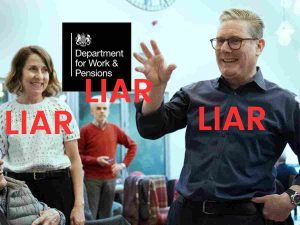Kim Leadbeater’s Assisted Dying Bill has passed through parliament at its second reading – despite vigorous campaigning from chronically ill and disabled people against it.
Assisted Dying Bill: politicians vote for state-sanctioned culling
On Friday 29 November, large numbers of anti-Assisted Dying campaigners came to parliament; more than groups like Dignity in Dying had organised:
People were vocal about their opposition:
However, in the face of Dignity in Dying’s campaign, it wasn’t enough. As the Canary has documented, the group has had huge financial backing from right-wing trusts, offshore donors, and pro-euthanasia advocates.
Moreover, the group has direct links to Keir Starmer’s government – which may well have helped influence the vote. Even some left-wing MPs like John McDonnell – historically supportive of groups like Disabled People Against Cuts (DPAC), which had spearheaded campaigning against the bill, reportedly voted for it.
However, during the Assisted Dying Bill debate one of the most powerful speeches came from a veteran Labour MP.
Discrimination is rife against disabled people
During the debate, Diane Abbott gave a powerful speech in Parliament objecting to the current form of the Assisted Dying Bill. The bill is intended to give terminally ill people the right to die when they choose. However, as the Canary has previously reported, there are serious concerns that the bill relies on the state ensuring disabled people are not coerced into dying:
Of course people should be allowed agency over when, where, and how their lives end. But the UK state, and society, cannot be trusted to endorse and carry it out on their behalf.
Risk tens of thousands of people’s lives every year in the future? Or alleviate at most a thousand people’s suffering in the immediacy? This is a choice we shouldn’t have to debate, and a choice MPs shouldn’t have to make.
But those are the positions the Assisted Dying bill has forced us into.
Now, Diane Abbott is speaking out to make the same points:
David Cameron is wrong. Discrimination is a fact across society for poor people, disabled people, Black people and Asian people. This includes both the health and the judicial systems. The assisted suicide bill offers no safeguards against it. https://t.co/kYl3E58aAu
— Diane Abbott (@HackneyAbbott) November 28, 2024
Assisted living
One of the key points Abbott has made is that the UK needs to become better at assisting people to live before it turns to assisting people to die:
Diane Abbott: I represent many vulnerable people. I will not be voting for this bill.
— Yuan Yi Zhu (@yuanyi_z) November 29, 2024
Abbott explained why she wouldn’t vote for the bill, saying:
I am not against assisted dying in any circumstances. If this bill passes, we will have the NHS as a fully funded – 100% – suicide service, but palliative care will only be funded at 30% at best. The former Member for Dunfermline, Gordon Brown, has said recently we need to show we can be better at assisted living before deciding whether to legislate on ways to die.
Abbott continued:
I represent very many vulnerable people in marginalised communities. I cannot vote for a bill where I have doubts about whether they will be protected.
She concluded:
We can come back, we can have a commission, we can pass a better bill, but I will not be voting for this bill this morning.
Earlier this week, Disabled People Against Cuts (DPAC), on behalf of a coalition of Deaf and Disabled People’s Organisations (DDPOs) made the salient point that the current bill is not accessible for deaf and disabled people. Disabled people are much more likely to be impacted by the consequences of this bill potentially passing. It would be a travesty if disabled communities weren’t given the time and space necessary to be involved in consultations for the bill.
Coercion will happen – make no mistake
Another central part of the objections to this bill are around coercion:
“Coercion is something that you will have no material evidence of, and that you cannot see.” 👏🏼 pic.twitter.com/zQCJR94UjF
— Fleur Elizabeth (@fleurmeston) November 29, 2024
Better Way, who oppose assisted suicide, shared more of Abbott’s words:
Diane Abbott says that a handful of people will “feel that they should not be taking up a hospital bed”. And she notes that “coercion in the family context can be not about what you say, but about what you don’t say”.
— Better Way (@betterwayUK) November 29, 2024
As Abbott argues, coercion is unlikely to be something that can be evidenced to the state or to courts. How exactly the bill allows for the possibility of coercion – a serious factor in the context of assisted dying – must be examined further.
In fact, a report from Better Way argues that assisted dying cannot ever be a safe practice:
Allowing this practice would give rise to profound injustices. Injustices that affect disabled people, people facing poverty, people who are isolated and lonely, and many others. No amount of legal drafting could rule out citizens electing to end their lives because they lack sufficient support to go on living. This, in itself, should prevent a change in the law.
Yet still, MPs voted the bill through. It received 330 yes votes compared to 275 noes – a majority of 55.
The Assisted Dying Bill: a shameful day for the UK
Campaigners outside parliament tried to reassure disabled people that the fight against the Assisted Dying Bill wasn’t over. It has more stages to go through and can still potentially be stopped.
That was cold comfort to many chronically ill and disabled people who the Canary spoke to outside parliament. Many were visibly distressed after what has been not only a physically and emotionally draining campaign – but decades of abuse at the hands of a state which has now turned on them once again.
Britain has systemically demeaned, abused, and stigmatised chronically ill and disabled people for decades. Parliament, and the MPs who voted for the Assisted Dying Bill, have now compounded that further. All of them will have blood on their hands in the future.
Cries of shame rang out from chronically ill and disabled people outside parliament as the vote passed – and they were right.
The passing of the Assisted Dying Bill is a shameful day for the UK. A stain on the MPs who just voted for further persecution of chronically ill and disabled people.
Featured image via YouTube screenshot/Evening Standard






